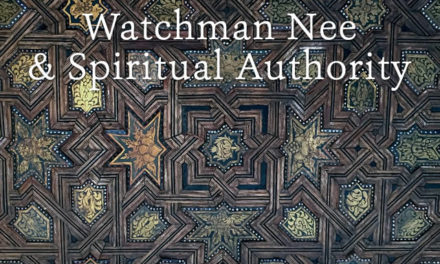“Now the Spirit speaketh expressly, that in the latter times some shall depart from the faith, giving heed to seducing spirits, and doctrines of devils; Speaking lies in hypocrisy; having their conscience seared with a hot iron; Forbidding to marry, and commanding to abstain from meats, …” I Timothy 4:1-3
What would be the case today if the founders of Mormonism, Jehovah’s Witnesses, and many other heretical groups had been taught, corrected and admonished in a respectful way, about the errors they were embarking on when they first began their religious explorations? This same question has been posed about Mao Tse Tung, founder of Chinese communism. Having spent some of his youth in a Christian environment what might have happened if he had been reached for Christ instead of Marx?
How should we as Christians respond to those who differ with us? It is quite possible that most cultic leaders, and most converts to cultism, were opportunities lost for the gospel. Though we cannot know, or control, the hearts of people who become involved in heresy we can, and should, seek to rescue such people before they seal their commitment to error. The question for us becomes one of how? How do we recognize the beginning of error, or as scripture calls it “giving heed to seducing spirits.” And then, how do we respond?
Keep in mind that we are only talking here about bible-based groups. Those who in some fashion were among us in the past but have “departed from the faith.” Cults that have spun off from non-Christian world religions are not here intended though the elements relating to human nature will apply there as well.
So what are the warning signs of departure from the faith, or into imbalance and abuse? To answer this question we must first understand why someone would be drawn toward error, or the abuse of others. Do they do so consciously, or willfully? I suppose there are a few Elmer Gantrys who consciously choose this path but most would make their choice without a full grasp of what is going on. In the words of scripture they are giving heed to seducing spirits. They are seduced, drawn by something attractive to them.
The Motives: Power, Prestige and the Purse
There are three areas of legitimate human need and desire that often are not met sufficiently (by the measure of the one in need), or quickly enough, to satisfy. So the temptation may be to fulfill their need by an illegitimate means. Those three areas include the sense of being in control, having significance, and having money. Let’s call them Power, Prestige, and the Purse. These are the root motivations out of which flow a behavior pattern of the misuse of power, the seeking of prestige, and the coveting of money.
The Bible gives many characteristics of the mature Christian leader and the attitudes of the follower. However, it also gives us the characteristics of the dysfunctional leader, and his blind followers. The examples found in Scripture are always found among those who are out of balance in the three areas of Power, Prestige and the Purse. They are illustrated graphically in both the Old and New Testaments but especially in Matthew 23.
The Methodology of Power
It must be noted that the “power” of spiritual leaders in the Bible is that of godly and humble influence, not coercive power. It is to lead and guide, not push. When things don’t go as a dysfunctional leader wants he may resort to coercive means to achieve them. The urge to control is a strong one especially among the insecure who lack faith in God and therefore resort to the use of various control mechanisms.
“But be not ye called Rabbi: for one is your Master, even Christ; and all ye are brethren…. Neither be ye called masters: for one is your Master, even Christ” (Matthew 23:8,10).
If Christians are all brothers and sisters before God then how can one be a master, or have superior authority over another? Aren’t brothers and sisters equal? The Reformation, and biblical, doctrine of the Priesthood of the Believer is at the heart of this issue.
Control mechanisms used may include:
Fear – of God’s displeasure if you voice your disagreement.
Guilt – for thwarting God’s purposes for the whole group and its leader.
Manipulation – if you will submit to God’s leader He will bless you.
Shaming – being labeled as a troublemaker for dissenting.
The only time in His earthly ministry Jesus resorted to coercive power was when He drove the money-changers out of the temple. These were people who had corrupted the godly function of the temple for their own corrupt use. They abused the people of God and His house, and so, enraged His Son. Let all who would do this take note of God’s special wrath.
The Methodology of Prestige
Every person wants to feel that his life is significant. This is legitimate. The perversion of this, however, is that the appearance of significance is more important than the substance, or that more significance is sought than is due.
Prestige is a commodity that can be used to obtain power and/or money. We see this frequently among politicians and activists in the secular arena. The human impulse at work there also occurs in the spiritual arena.
The dysfunctional leader therefore may seek to “sit in Moses’ seat,” the seat of authority from God (Matthew 23:2), and to be seen as a “channel” through which unquestionable words pass. However, the corrupt motivation in the heart of such a leader can result in a façade of righteousness.
“But all their works they do for to be seen of men: they make broad their phylacteries, and enlarge the borders of their garments, and love the uppermost rooms at feasts, and the chief seats in the synagogues. And greetings in the markets, and to be called of men Rabbi, Rabbi” (Matthew 23:5-7).
“Woe unto you, scribes and Pharisees, hypocrites! For ye make clean the outside of the cup and of the platter, but within they are full of extortion and excess” (Matthew 23:25).
Once this false prestige is achieved the dysfunctional leader may prevent criticism by various means including the elevation of those who agree with him and the demotion, or elimination, of dissenters thus presenting a solid front of the leadership to the followers. (See also Galatians 6:12,13)
Some of the characteristics common to false prestige include:
Elitism – being set apart from the common man, preferring the company of the elite.
Appearance is All – a hypocritical disconnect between reality and how things appear.
Unquestionable – their self-important status places them above question.
The Methodology of the Purse
Money is a medium of exchange for most things obtainable in life. It is absolutely legitimate for a minister, like any other person, to seek it for its proper uses. It is not the seeking of money that is amiss but its love.
Money like prestige and power, can be converted to obtain the others.
“…they of the circumcision: Whose mouths must be stopped, who subvert whole houses, teaching things which they ought not, for filthy lucre’s sake” (Titus 1:10,11).
“And through covetousness shall they with feigned words make merchandise of you: whose judgment now of a long time lingereth not, and their damnation slumbereth not” (I Peter 2:3).
Something that is remarkably consistent among all the cults is their wealth. There is a preoccupation with it. Ostensibly the money is for the furthering of the influence of the group and its message but somehow the leadership seems to enjoy a lot of it. Rev. Moon lives on a palatial estate in New York. Judge Rutherford enjoyed a mansion in San Diego with a $9,600 Cadillac during the Depression. Many other such examples could be cited. The point should be that spiritual leaders don’t have to be in poverty but neither should there be a significant disconnect between them and the people they lead, especially if they are asking for financial sacrifices by the followers.
Common characteristics of financial imbalance include:
Buy a Blessing – promises of material blessing for financial sacrifice to the group.
Shell Games – difficulty ascertaining financial integrity.
Burdensome – those who cannot afford it are shamed and manipulated into sacrifice.
Devourer– Leader is “well off” at the expense of the needy.
Conclusion
The corrective for the imbalance of Power, Prestige or the Purse is simply stated, but may be difficult to effect. It is a genuine and effective two way accountability between leadership and followers. A necessary element for that to be effective is the presence of informed and discerning followers. When the followers do not inform themselves and think critically about issues they are abdicating the role God intended for them. They are choosing to remain spiritual children, dependent on their leaders.
Paul said, “Be ye followers of me, even as I also am of Christ” (I Corinthians 11:1). The converse of that is that if Paul ceases to follow Christ then Christians should cease following Paul. Now how do you know how to do that without two way accountability and an openness by the leader, and discernment by the followers?
Organizational polity, or method of government, is also an important factor. Again, two way accountability must be a part of the polity. But the absence of a good polity is not determinative. Good people can use any system. The risk is when a weak governing system accepts into leadership someone who will attempt to meet his personal needs by some illegitimate means, or seek to lead the group into some fringe, or pet, theological theories. The absence of a good system of checks and balances will leave an open door of opportunity to the dysfunctional leader.
It is the responsibility of every Christian to know the Word of God, be discerning, and courageous in our stand for truth and just relations among men. We must also watch the dynamics, or milieu, at work in a religious system to notice changes that will condition us to become like the frog in the kettle, not knowing that we are at risk.
By David Henke






